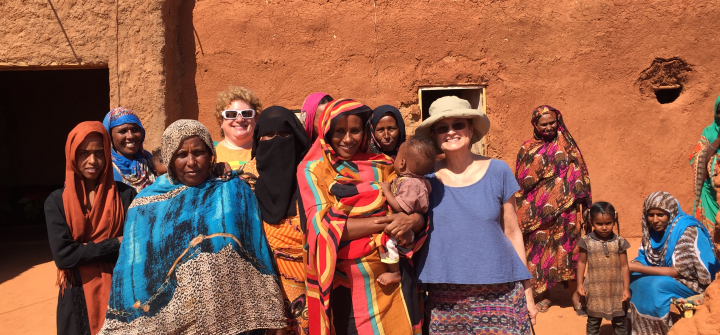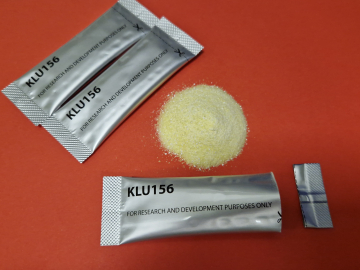Changing the Global Health Paradigm: Michele Barry
Moving to the West Coast 9 years ago made a big impact on Michele Barry’s thinking about global health. Working in Silicon Valley and at Stanford University, she’s learned a lot about the importance of human-centered design. “I think you need to bring the community and all disciplines that might have impact on a problem, to the table. And then you make your decision about how to approach it,” says Barry, MD, the director of Center for Innovation in Global Health and a senior associate dean at Stanford University School of Medicine.
In this first of a 2-part Q&A with Global Health NOW, Barry discusses pandemic threats in fragile states, the need to change single-problem approach in global health, and priorities for Stanford’s global health program.
Read part II here.
What is the biggest global health problem that's not really recognized, that's not on everybody's radar?
The potential for pandemic disease in areas of civil war and fragile states. And that we're not doing a good job at either factoring in some of the aspects of what happens in a fragile state. I mean, we saw what happened where Ebola broke out. But if you look at where all of our pandemics have happened—and over 70% of those are zoonoses—most of these pandemic diseases are in subtropical and tropical [areas].
But if you think about where those subtropical and tropical regions are, they're really in areas of fragile states. And fragile infrastructure. Food insecurity, so people wind up eating bush meat. They wind up going into the forest. They wind up being internally displaced, where diseases are amplified. They wind up interrupting vector cycles in those forests. And I see that, unless we pay attention to those particularly fragile states or states coming out of genocide, we're going to be sitting and watching another pandemic evolve.
You and your colleague Paul Wise wrote about this in Daedalus. You were really looking at it in terms of civil wars.
Mm-hmm. Because if you look at where Yellow Fever broke out [last year], in Angola. A country which just had like 17 years of civil war. And also in the Democratic Republic of Central Africa. Again, two unstable areas. Look what's happening in Syria or Yemen. 300,000 people infected with cholera, and 2,000 deaths. And it's in the midst of a fragile state.
There needs to be a strengthening of the international health regulations. I think it's a start to have a WHO pandemic preparedness division. And I also think ... this is something Paul and I have been thinking and talking about, is developing islands of excellence within fragile areas and fragile states.
And what would those look like? Are you talking about supporting labs?
Well, yes. Exactly.
Surveillance?
Yes. Setting up good surveillance. Setting up sentinel surveillance. Having a sort of mini CDC for a geographic area of weak infrastructure.
But that's hard to do, right? Especially within civil war or a fragile state, where there's a lot of actors and a lot of potential risk.
Right. But you know, people don't want their kids dying of polio. No matter where you are in war, they don't want their children to be dying of cholera or polio. And I actually think you could get the political will to do this. I mean, you need leadership at the WHO.
Another area that I'm interested in—a clear issue that we need to be paying more attention to, is climate and climate's impact in particular on megacities [of 10 million or more people] as we urbanize. Many of these megacities are also coastal megacities, and I think we're going to see tremendous impact with climate on megacities.
I think there are all these hidden issues in these megacities that climate is going to impact. The concept of urban heat islands, and as our demographics change and we get elderly people, the concept of heat strokes. The concept of not being able to exercise. I don't know how anyone could exercise in some of these megacities.
There are other aspects about what it means to live in a vertically challenged setting, rather than a flat setting, as people age. The whole concept of transitioning from your garden that you had in your village, and now all of a sudden, you're eating processed foods, not exercising. It's just a setup for NCDs and metabolic syndrome, and diabetes. So, I've been interested in looking at some of the impacts on health. And I think there are ways to actually plan ahead, to make a difference.
I'm curious about your take on what global health can do in situations like that. Whether it's urban design, or dealing with conflict in states and civil war, these are often issues that are sort of beyond the traditional purview of global health. How does global health and people in global health make a difference in these areas?
I guess I’d challenge you a little bit [on that]. My concept of global health is a very transdisciplinary approach.
Even though I am a tropical disease doctor—[trained] to think about hemorrhagic viruses and malaria—I don't think we can think about vertical diseases anymore. I think you have to think about those diseases within the context of where you're living. So that when you're thinking about malaria, you're not just thinking about artemisinin compounds or [bed] netting, but you're thinking about vector control. You're thinking about sanitation. You're thinking about where you're building your latrines. You know, there's just so much that goes into a global health problem, that if you're stuck with just the typical idea of what you think a global health doctor is, forget it. You really need multiple disciplines. So, I don't think it's out of the regular purview.
But if you're in the Ministry of Health, and you see these things going on, how do you affect the change that needs to be done, in terms of designing the city, or getting access to an area held by rebels, that kind of thing?
Those are two very different questions.
Sure, right.
You know, again, I think we need to change the paradigm about how we think about global health problems. And that it can't be just about one issue. I think you need to bring together working groups from different disciplines. And I think you have to think about something that I've learnt a lot of coming to the West Coast and working in Silicon Valley and at Stanford, and that's human-centered design. That you actually need to get into the field and understand what the needs are from the grassroots up, to be able to solve it. And I think ministries of health can't just externally say, okay, we're going to quarantine everybody with Ebola. I mean, you saw what happened in Liberia when they did that. Or we’re going to give it over to the military. I think you need to bring the community and all disciplines that might have impact on a problem, to the table. And then you make your decision about how to approach it.
I want to talk a little bit about your center here. It's 9 years old. Has it fulfilled all that you want it to have done?
Oh, absolutely not. We are still growing. It's been a great ride. When I came here, there was no dean for global health. I was the inaugural dean. And it was a matter of really listening to what people were doing at this university. It's a fabulous university. And I think what they just needed was someone to galvanize the work that they're doing. And so, we now have 170 faculty that are part of the center. We have at least 10 to 12 active working groups.
But it's been easy to think about where Stanford can make a difference. I am not trying to compete with Hopkins. I think Hopkins is a great. And I don't want to compete with Berkeley or USCF. Where I think Stanford can make a difference is in the areas that they have particular strength in. We're in the middle of Silicon Valley, so technology and innovation around global health is going to be our strength.
Another area is, we have probably one of the leading environmental centers, the Woods Institute [for the Environment], so climate and health. We have great people thinking about governance and global health, and refugees and conflict. We have a fabulous business school here that just got a huge, $140 million donation to mitigate poverty. So, I think that social entrepreneurship and global health entrepreneurship is going to be another one of our, what I'm calling, sweet spots. And then my sweet spot is going to be around gender and equity.
I don't have any aspirations to make a public health school [at Stanford], or to complete with the public schools around there. But I think what we can do is work at it from a transdisciplinary university approach to global health. It's a little bit of a different, a horse of a different color.
Join the tens of thousands of subscribers who rely on Global Health NOW summaries and exclusive articles for the latest public health news. Sign up for our free weekday enewsletter, and please share the link with friends and colleagues.
Michele Barry (right) during a visit to Khartoum, Sudan, to work with Alzaiem Alazhari University colleagues to strengthen research and potential surgical and emergency room services. (Image courtesy of Michele Barry)





